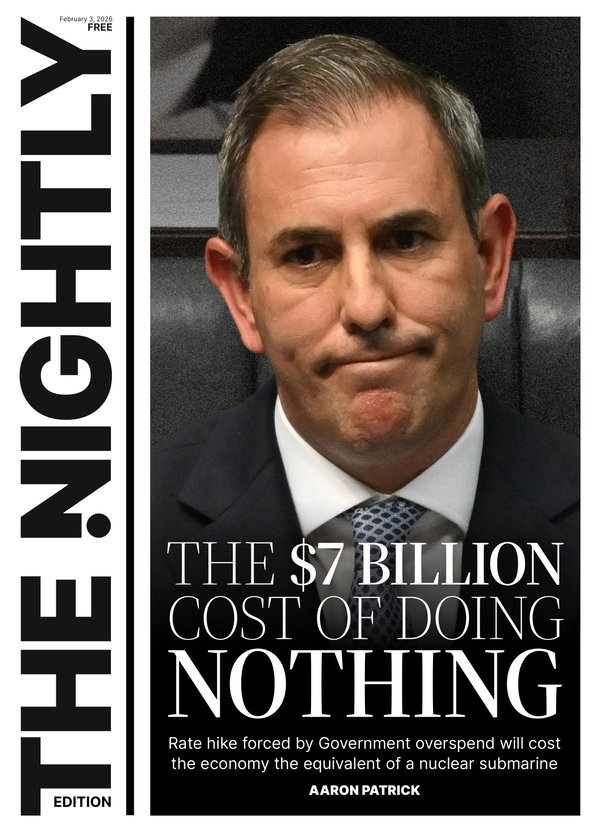Bruce Brammall: Even in these rental boom times, you need to think twice about becoming a property investor
DEBTMAN: Perth property returns lead the nation at nearly 28 per cent. It’s enough to make a homebuyer watching their own home value surge want to become a landlord. But how much is luck versus skill?

The sounds of “snap, crackle, pop” are getting a little louder — like lifting a bowl of Rice Bubbles from the table right to your ear.
The strains in the economy — big swathes of it at least — seem to be creaking away, sounding out stresses of households looking to cut costs.
However, inflation suggests we’re still able to spend a little more freely than the Reserve Bank wants us to. It seemed highly unlikely only a few months ago, but another interest rate rise seems a possibility, even next month.
Sign up to The Nightly's newsletters.
Get the first look at the digital newspaper, curated daily stories and breaking headlines delivered to your inbox.
By continuing you agree to our Terms and Privacy Policy.Property investors, in most parts of the country, are in a good place. While interest rates have been rising, they are at least tax deductible. And they’re also benefitting from generally stronger rents.
But the smile on their dial — everywhere but the basketcase that is Victorian property — is coming from strong capital growth, which is making interest rate pain bearable.
Total returns — capital gains, plus income/rent — for the past 12 months is averaging north of 12.5 per cent nationally, while Perth is leading all comers at nearly 28 per cent.
It’s enough to make a homebuyer watching their own home value surge think: “I’d like a piece of this property price action as an investor”.
Whole new game
It’s a natural reaction to watching your home stack on a couple hundred thousand dollars in a short period.
While being a proud homeowner is one thing, don’t overestimate how much luck versus skill might have been a part of your early property success.
You probably bought when you could afford to, rather than particularly, deliberately, bought believing a boom was coming.
Moving from being a homeowner to a property investor is not an easy or natural transition for most. But, get it right and the rewards of being a property investor can be sweet.
But it is a road paved with potholes to navigate.
Chalk and cheese
There are key differences between buying a home and an investment property.
Buying a home should be about meeting emotional needs — near a lifestyle you want to live, or near family, or schools, or work. It needs to (or should) make you happy, hopefully feel safe and adds personal satisfaction to your life.
An investment property is about one thing and one thing only — making money. You’re not going to live there. You need to buy something that will, hopefully, rent well and grow in value.
If you’re not making money out of an investment property, why on earth would you buy/hold it? You’d be better off having your money in some other investment — bank account, bonds or the share market.
While capital growth is nice when it happens to your home, it’s actually not a critical element of what will make you happy.
It is an important difference to understand. If you can’t get that into your head, forget about property investment being right for you.
Owner versus landlord
How you treat the property is going to be totally different too.
With a home, you will make decisions based on affordability and personal choice, generally whatever will turn your house into more of a home. But it’s expensive and virtually nothing you do will be tax deductible, so you’re paying with after-tax dollars.
When you’re a landlord, you should be aiming to do things that will protect the value of the property, or uphold, or even increase its appeal to tenants.
Most things that tenants ask for are usually pretty reasonable. And when your real estate agent recommends maintenance, it’s generally going to be about safety, or protecting your investment.
Most of what you spend will be tax deductions or depreciable, which considerably reduces the cost of spending the money.
Owner plus landlord
Choosing to add being a landlord to being a homeowner is adding a huge new bunch of expenses to your life.
Being a stingy landlord who says no to everything is not a smart way of protecting your investment and making money long term — your property will be worse because of it and you’ll turn over tenants frequently.
There are so many considerations and risks to becoming a landlord that books are written about them (including a number by myself) and can’t be covered in a short column.
It’s a big step. Don’t take it lightly. And don’t just chase returns — returns of recent times will not continue into the future.
Bruce Brammall is the author of Mortgages Made Easy and is both a financial adviser and mortgage broker. bruce@brucebrammallfinancial.com.au
